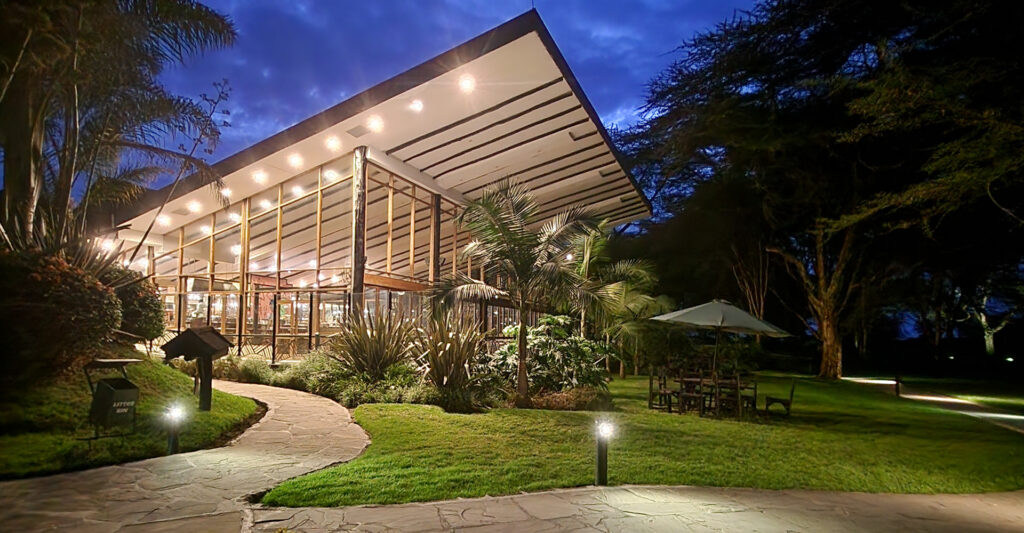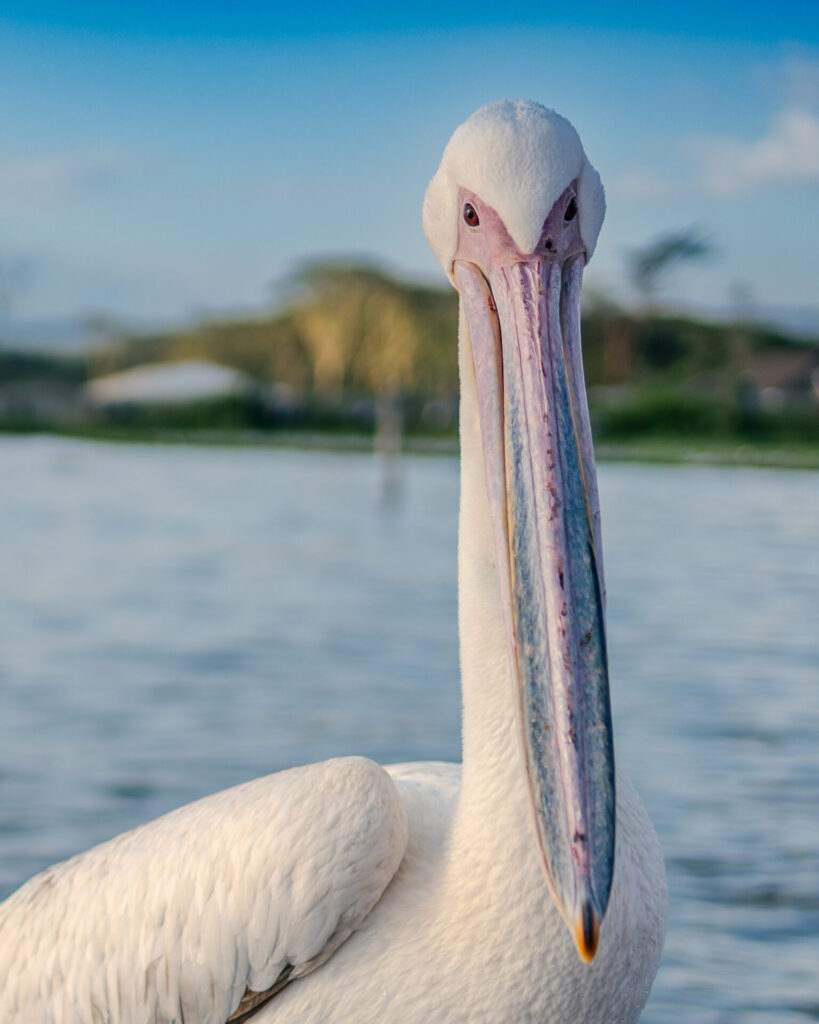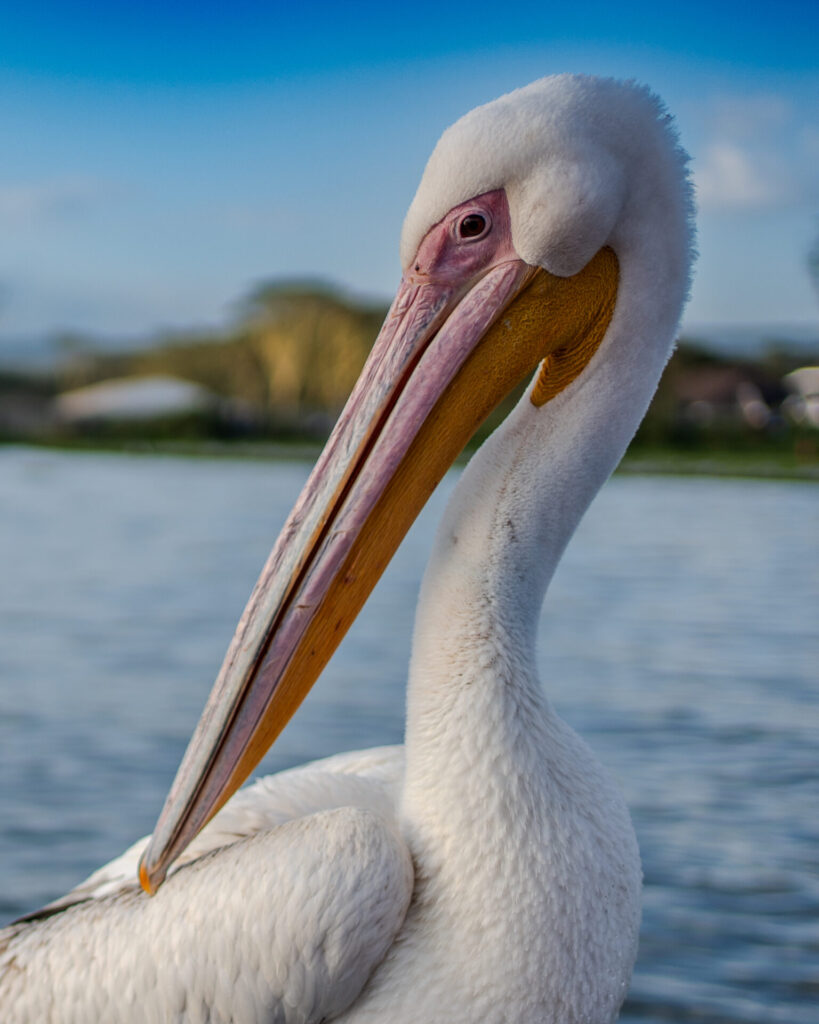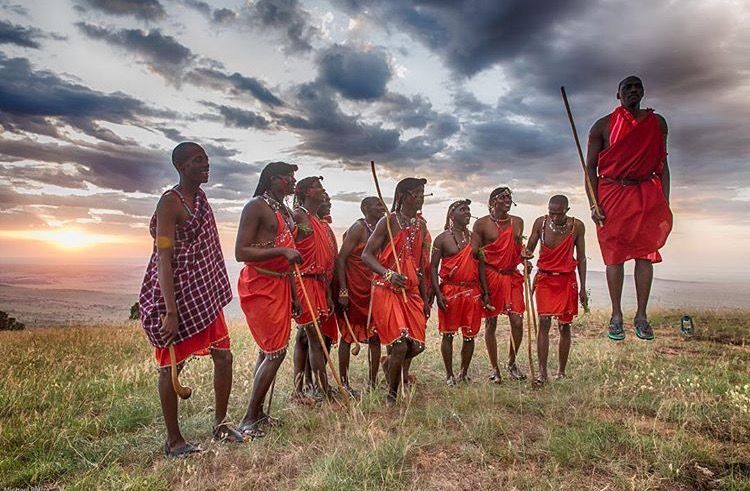By now you already know the morning story, so let me take you straight to the Masai Village. Just outside the boundaries of the Masai Mara, we saw the wide, open land where the Masai tribe lives. In the middle of it stood a traditional Masai village, surrounded by a fence made of branches and twigs.
Martin parked our vehicle outside the village, and there we saw a group of Masai men waiting to welcome us. They wore their traditional attire—bright red and blue checkered shukas—along with colorful beaded jewelry. Each of them carried a walking stick called a fimbo.
One man stepped forward to introduce us to the tribe. His name was Thomas. He was tall, handsome, with hair braided with beads, a stick in his hand, and white paint stripes across his body. He explained that he would show us their culture, answer our questions, and that we were welcome to take photos.
Our visit began with the traditional Masai song and dance, which was meant to greet us, welcome us, and bless us. But it wasn’t just a performance—we were invited to join in! And let me tell you, this was no ordinary dance. Definitely not the boogie-woogie we do at school functions.
The tribesmen formed a line and walked in a circle, swinging their sticks while moving their upper bodies back and forth—kind of like wobbly jelly. I managed to copy the moves, but when I looked at Rani, I nearly laughed out loud. She bent forward so awkwardly it seemed like she might throw up! Every now and then, the song broke into a rhythmic “Humm, Humm,” which sounded really cool. One man blew into an antelope horn, and another carried a lion skin, proudly showing what the tribe had once hunted.
At the end, everyone stood in a line side by side. That’s when the famous Masai jumping began. The men leapt straight into the air, so high it was amazing to watch. When it was our turn… well, things didn’t go quite the same. We barely managed a foot or two off the ground. My dad, with his belly, looked hilarious trying. Aunty Rashi jumped so hard her hat flew off again. Uncle Ravi picked it up. Rani just gave a tiny skip.
And then came my turn. I jumped—and disaster struck. I had candies hidden in my shirt pocket (which I hadn’t shared with anyone, especially not Rani). The moment I landed, all the candies flew out and scattered everywhere. I grabbed them quickly, but it was too late. Everyone had already seen it.
After the jumping dance, we took some pictures and videos. I kept staring at the Masai men’s feet—how did they spring so high? It was like they had extra muscles hidden in their ankles. I mean, I could only manage jumps like that if I bounced on a mattress, and even then, I’d crash back down instead of landing perfectly like they did. These guys were seriously talented.
But the dancing wasn’t the end of it. Martin then took us inside the village to show us how the Masai really lived. The moment we stepped through the gate, we saw small mud houses, not very tall, all arranged in a big circle. The center was a wide open space where everyone gathered.
Thomas explained that the women built these houses. They used mud plastered with cow dung, then finished the roof with branches, shrubs, and twigs. To waterproof it, they added a layer of tarpaulin, and the roofs were arched so rainwater slid right off.
When we entered one of the homes, I was surprised—we had to step down instead of up, unlike in modern houses. The ceiling was so low that the elders could reach up and touch it. Inside, there was one small area for cooking and another tiny corner with cowhide laid out like a bed. It was too dark, with no real windows—just a couple of tiny holes in the walls to let daylight in and cooking smoke out. Honestly, it looked tough to live there, but the families didn’t mind. They were proud of keeping their traditions alive.
There were children running around too. One little girl carried a wooden doll, and of course, Rani had to check it out. She tried talking to the girl and playing with the doll, which I knew could only lead to drama.
Meanwhile, Thomas led us to an open space to show how the Masai make fire. No matches. No stones. Just wood. He placed his sword flat on the ground, set a piece of hard wood on top of it, then rubbed a softer stick against the same spot over and over. Soon, smoke started rising. A few twigs were tossed in, and suddenly—there it was. Fire! I was amazed.
I wanted to try it myself, and Thomas was ready to let me. But then it happened.
The cry. The same wail that always meant trouble. Yep, it was Rani—sobbing about the wooden doll. She wasn’t satisfied with any souvenirs at the little market; she wanted that exact doll. Thomas even tried convincing the little girl’s mother, while Aunty Rashi waved money around, but the little girl was just as stubborn as Rani. Honestly, I found it hilarious. For once, Rani was getting a taste of her own medicine.
While the two “lion cubs” glared at each other like rivals, I wandered around, imagining what life must be like here at night. Hens scratched at the ground, and I thought of how eerie it must feel on a full moon—lying in one of those dark huts while wild animals howled from the forest. Thomas had told us that the Masai sometimes drank animal blood and made stew from it. I pictured their warriors fighting off predators, then celebrating with a feast around the fire, singing songs of bravery. It felt like stepping back into history.
Eventually, the doll drama ended. The little Masai girl finally agreed to trade her toy for some cookies and chips we had. We thanked Thomas and the villagers, took a few last photos, and set off again. Lake Naivasha was our next stop.
Back in the vehicle, the moment I dreaded arrived: Rani asked me to share my candies. Normally, I wouldn’t mind, but these were my special tamarind-and-menthol ones. And I was running out! Still, under my parents’ watchful eyes, I handed her a few. She sprawled out across the backseat with her head in her mom’s lap, slowly dozing off while sucking on the candy.
I leaned back, slightly frustrated, but my mind drifted again to the Masai village. We’d even bought some of the fire-making wood and tools from them. I couldn’t wait to try it myself when we got home.
When we reached the Lake Naivasha area, I was half-asleep. This wasn’t deep in a forest like before—it felt more like a suburban town. Our resort was called Sawela Lodges, and to my relief, it had solid brick walls and proper hotel-style rooms. That meant I wasn’t going to freeze in the morning.

The lodge was beautiful—huge restaurant, wide green lawns, perfect for running around or playing sports. I wanted to stay and sprawl out on the grass, but we were here for just one day, and boating at Lake Naivasha was already on the plan.

“Who goes boating? I’d rather stay here, enjoy the view, and devour the buffet,” I declared. And oh, that buffet! It was massive, and I tried almost everything. Even the others piled their plates high, testing out new dishes and falling in love with them.
After lunch, we went to our interconnected rooms. The two families could walk in and out through the connecting door, which made it feel like one big home. The grown-ups debated whether the boat ride was worth it or if we should just relax. In the end, they listened to Martin—he insisted it was a must-do, especially since this was our last day with him. Tomorrow, his friend John would drive us to Amboseli, our final safari stop.
So we started getting ready. I used the washroom first and returned with the disappointing news travelers from India often face abroad: no water with the toilet. Only tissue paper. At least Ashnil Mara Camp had some water! Still, I managed a warm bath and came out refreshed.
Mom went in next, but within seconds, she came running out, towel wrapped around her.
“What happened?” Dad asked.
“There’s a lizard on the hand towel!” she shrieked.
“So what? It won’t hurt you,” Dad said.
“Then you take a bath!” Mom snapped.
So Dad went in, carried the towel outside, shook it, and when the stubborn little lizard did not budge, he tossed the towel out in the corridor. Problem solved. Mom showered in peace, then Dad followed.
By then, I was ready and sitting on the balcony. To my surprise, Rani was also there in the balcony next to ours, dressed before her parents. She leaned on the railing and whispered dramatically,
“Did you know hippos in Lake Naivasha attack boats? Like whales, they rise from underneath and flip them over!”
“Who told you that nonsense?” I asked.
“Mom saw it on YouTube…” she started
“If you’re scared, just stay in the room,” I teased.
“I’m not scared.”
“Then prove it. Touch an animal today. Just one finger.”
She smirked. “Okay, you’ll see.”
By 4:30 p.m., we were at Lake Naivasha. Zebras and deer strolled around like friends, and the wide sparkling lake stretched ahead of us. Once we boarded the wobbly boat, the chilly wind hit. Life jackets kept us warm enough, but my ears stung, so I held them with my hands. Rani was smarter—she wore a beanie.
The scene was magical, straight out of Jurassic Park. We floated past a half-submerged mansion, eerie branches rising from the water like Medusa’s hair, and vultures perched on a dead tree, scanning for prey. Hippos bobbed like fat balloons, their eyes peeking at us from the surface.
“There’s your chance,” I nudged Rani. “Want me to tell the boatman to steer closer so you can touch one?”
She ignored me, pretending to admire the orchards and mansions on the shore where giraffes actually strolled across lawns. Who even lives like that?
Suddenly, the boatman halted the boat mid-way and asked us to look at the eagle sitting at the topmost branch in front of one of those mansions. The bird sat there still, like a statue, its golden eyes fixed on the lake, wings folded neatly but with a kind of hidden power that made it look fierce even while resting.
The boatman told us he was going to make a sound to attract the eagle’s attention. He reached into a small basket by his side and pulled out a dead fish. We all leaned forward, curious, waiting to see what would happen.
He let out a sharp whistle that cut through the air, and then tossed the fish into the water near our boat. For a few seconds nothing moved. The fish floated silently, and we sat frozen, eyes glued to the eagle.
Then, suddenly, the bird opened its enormous wings with a loud flap, dived straight down from the branch like a bullet, and in less than a blink it scooped the fish right out of the water..
We all gasped at the same time—it was so quick, so powerful, almost like watching a scene from a movie.
We’d missed filming the whole thing—our cameras were too slow for the eagle’s speed. So we begged him to do it again for us. The boatman whistled again, pulled out another fish, and repeated the trick. And this time, though the eagle was just as fast, we were ready with our phones recording, trying to capture every second of it.
Next, we saw these big swans—but when we drove closer, we realized they weren’t swans at all. They turned out to be one of the most fascinating birds I had ever seen. They had snowy white, velvety feathers, and their most striking feature was their extra-large yellow beaks.
When we came closer, the boatman took out another dead fish, which made them swim toward us. Three massive exotic birds, with mouths so big we could have dropped our phones right into them. They were big enough to topple us out of the boat. While we leaned back nervously, Rani, who sat closest to them, leaned forward and gave a gentle stroke to the bird’s furry belly.


She looked at me, grinning with her winning teeth.
“That is cheating!” I said. “That is a swan, it’s not even a wild animal?”
“It is no swan—this is Pelican,” said the boatman. “Pelicans are large water birds known for their distinctive long beaks and expandable throat pouches, which they use to catch fish.”
“Then feed them the fish you have,” said Rani.
“No, dear. I keep this fish for the eagles. I just showed it to them so they would come near.”
“That is unfair!” Rani and I almost said together.
The elders laughed along with the boatman. They were singing and having the best time, enjoying the mesmerizing scene of the lake.
It was indeed magnificent. We were floating on a water body over the Great Barrier Reef. The sun had begun to set, and the reflections on the moving water glistened across the lake—soft yellows and oranges, with the fresh evening breeze and chirping birds. It was too good to be true, intoxicating, like a dream—it felt like music that makes you want to do only good things.
So, I stood up carefully and went back to sit with Rani at the back. Her mom came over to sit beside my mom and take selfies. The boatman hummed and steered the boat, standing behind us.
“Okay, I give you this one—you really did win. I wouldn’t have touched that pelican for sure,” I told Rani. I was still covering my ears because of the cold.
“So, you agree that I am brave?” she asked sheepishly.
“Yes, I do!” I said. “And I believe you are now up for any adventure.”
She removed her beanie cap and gave it to me.
“Here, you can cover your ears,” she said. “I have another one in my little bag.” She pulled out another from her bag.
“And you had two caps with you all along and only help me now?” I asked, appreciating her kindness but still feeling betrayed.
“Yes, because you are good to me; so I am good to you.”
“Well then—you can have these candies too.” I took some out of my pocket and handed them over.
We all smiled and sang our way back to land, floating over the reflections of the setting sun. La la land.
When I went to sleep, I remembered I had forgotten about my one good deed for the day. But then I realized—when we sat for dinner, I had been the one helping fetch little things for the ladies. Mom said, “Can you bring me some Greek salad?” and I grabbed a quarter plate from the buffet and gave her some. Aunty Rashi asked for soup, and I did that for her. And when Rani wanted more pastries, I got them for her too.
Even my dad said, “You are being very helpful today, my son. I am so glad to see you this way.”
So, there was a sense of relief and also joy in me—because it was a day I wasn’t scolded by Mom, wasn’t annoyed by Rani the way I thought I would be, and got to see the most beautiful views of nature.
After packing the bags for the next day, everyone drifted into a peaceful sleep. Then, halfway through, during midnight, someone started screaming. We knocked and opened the connecting door to find Rani shaking with fear.
“It is just a nightmare, dear,” her mom was consoling her.
But she said, “It was not a nightmare. It was a vision. I saw a monster attack us in a forest. We were in a hotel with broken windows and tattered furniture. There was no light, and tall grasses and plants crawled across us. All around us lions and wild animals were howling and roaring. And when Dad stood up to close the door—a lion came and attacked him.”
“That is just a dream, beta!” my dad said. “We had so much fun today, didn’t we? And we were completely safe, remember? It will stay the same for the rest of the tour!”
“And you were so brave too!” I added. “You touched that pelican!”
“I did, yes,” Rani said. “Because I had dreamt of them too. I saw them in my dream and touched them in my dream, and they were my friends in my dream. So I knew they wouldn’t harm me.”
“Oh, dear, that is just a coincidence,” said Aunty Rashi. “Do not worry; we will all be safe and have the best time of our lives. Now try and sleep.”
I went back to my room, my mind buzzing. Could Rani really be right?
That would explain how she could be so fearless touching those pelicans—when most of the time she was scared of everything. Did she have some kind of psychic power, or was it just luck?
A shiver ran down my spine as I thought about her vision, her dream, and the strange connection between them. Excitement, jealousy, and a tiny spark of fear swirled inside me. One thing was certain: with Rani, nothing was ever ordinary, and the adventure was far from over.
We could only wait—and watch.
Read Episode 1: Episode 1 : The Insufferable Rani
Read Episode 2: Episode 2: The Journey begins
Read Episode 3: Episode 3: The Day of Felines
